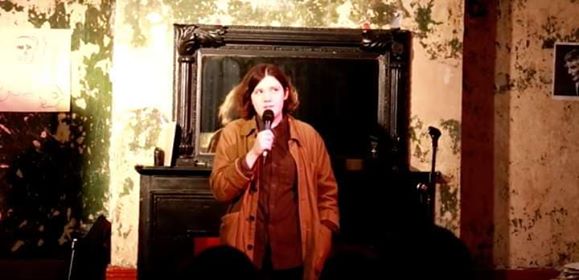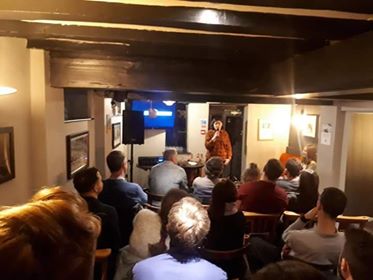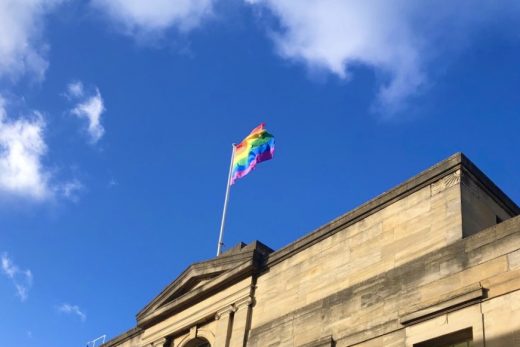Caitriona Dowden reflects on life as a quarantined comic.

I tried stand-up comedy for the first time almost exactly a year ago in the Regent’s Park JCR, spurred on by a considerable amount of wine, and a latent desire for attention usually overridden by introversion. From then on, I spent every waking moment pursuing my dream of making it big on the local open mic scene, to the detriment of all of my other interests and social life.
Before long, I was performing three or four times a week. I’d fill notebook after notebook with my much-needed observations about popular culture and religion, and every conversation became an opportunity to test material on my long-suffering flatmates. I was haemorrhaging money on train tickets and late-night meal deals, travelling to such exotic venues as Banbury, Reading, and Bicester Village. But it was all worth it for the buzz of performing, and I cared about it more than anything else (unless any of my tutors are reading this, in which case I always put my academic work first).
I’ll always remember my first London gig – a backroom in an Ealing pub, playing to ten other comedians and a baffled family of four. The actor who played Cook from Skins was sitting at the bar. He didn’t come in to watch the comedy, and if anything he seemed irritated by the disruption, but in that moment, I knew that I was where I belonged – honing my craft in the big city, surrounded by stars.
The outbreak of a global pandemic has somewhat taken the wings out of my sails.
Partly because I’m worried about the people I love, I miss my friends who are far away, and being forced to leave Oxford is heart-breaking. But mainly because I am no longer allowed to stand on a stage and tell jokes to largely indifferent punters.
Comedians deal primarily in laughter. This is provided by audiences, who are, on the whole, made up of people. Not being allowed to congregate makes this transaction difficult. Most gigs also happen in pubs, which, according to ‘science’ cannot stay open during a pandemic, though as Tim Martin pointed out, there was none of this nanny state nonsense during the blitz. He makes a good point. During the Second World War, it was perfectly acceptable to go for a pint, come into contact with a bombing, and pass it on to your unsuspecting family, only for them to explode seven days later. Unfortunately, so-called ‘experts’ won that debate, and I spent the first week of the vac watching my upcoming gigs get cancelled one by one.
I consoled myself with the thought that I could take the time off to pursue my other interests. It was only then that I realised I had replaced my personality with ‘trying to make it in stand-up’, and that without stage time, I was a shadow of my former self.

At first, I tried cracking a few jokes around the house. One afternoon, my mother announced her intention to put on the news and find out what the rules of quarantine would be.
I saw an opening: “The first rule of quarantine is ‘don’t talk about quarantine’. The second rule of quarantine is ‘don’t go outside’”. It was far from my strongest work, relying on an overused pop culture reference and unsophisticated punchline, but I thought it was worth a noncommittal chuckle at the very least. Instead, my mother chided, “We certainly will be going outside. If you don’t get any exercise or fresh air, your immune system won’t be able to fight the virus.” I explained to her that I had been joking, and she replied that it was hard to tell when I was trying to be funny, because my tone of voice was always the same. When I tried to explain that I was a deadpan comic, she didn’t seem impressed. Later on, my sister made a fart joke, and it killed.
When I returned from sulking in my bedroom, I found them all watching Ed Gamble’s comedy special, and laughing at regular intervals. That was when it dawned on me that I was not the problem. They wanted arena comedy, whereas I was an artiste. It’s bad enough dying onstage for five minutes in front of a pub crowd you’ll never see again, but being quarantined with an unreceptive audience who didn’t enjoy Stuart Lee’s Comedy Vehicle and have been to see Milton Jones four times?
By week three, I found myself reminiscing fondly about my most painful gigs: the fundraiser in a vegan bar in Soho, where the only reaction I got out of the audience was a round of applause for the word ‘lesbian’; a seedy pub in Hammersmith compered by a Ukrainian Youtuber wearing a t-shirt of his own face, who threatened to follow an audience member to the toilet, then watched all seven acts perform to dead silence; the time my local open mic closed with a twenty minute pun battle.
At one point, I wondered if it was a sign of privilege that my biggest problem during the pandemic was an inability to share my comic genius with the world (or at least with the people of Newbury). Then I thought, ‘No, don’t be ridiculous, this is agony’.
So during this difficult time, spare a thought for those of us whose sense of self has come to depend upon the approval of strangers. Maybe, once we’ve finished commending the genuine heroes who are keeping the country afloat at great personal risk, we could all open our front doors, and laugh together in support of our local stand-up comedians.




Catriona, this had me in splits. Dry, witty, meaningful and indeed, deadpan. There has never been a greater need for stand up than now so keep doing your thing, any which way you can and you can be sure we, and many others, will be standing outside our doors applauding.
Expecting your Mum to laugh understand Stuart Lee, and during lockdown? Honestly, Caitriona – you want the moon on a stick!